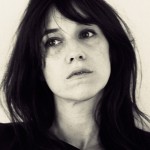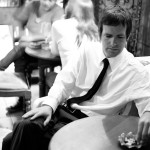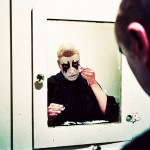
Photos by Travis Huggett; video by Aaron Richter
Interview by Andrew Parks
“We just had a power meeting,” explains Casey Spooner, as self-titled reboots an interview that was supposed to start 15 minutes ago. Not because the singer/performance artist was busy doing more important things…Okay, he was–exhausting tasks like nailing two glitzy music videos and hosting from-dusk-’til-dawn rehearsals (Fischerspooner‘s first elaborate stage show since being dropped by EMI and returning to a DIY route) within one endless week.
“With [the] Odyssey [tour], I knew things weren’t going to go well because our first show was a House of Blues in Orlando,” says Spooner. “The first performance of this tour was me and three dancers in Bushwick for 100 people. That’s the perfect place to start, I think.”
To be clear, that first performance was actually with Spooner’s old band Sweet Thunder, which once counted s/t favorite Gavin Russom among its members. Fischerspooner had its own run of back-to-basics shows soon after, however, as Spooner, beat sculptor/producer Warren Fischer, and the pair’s collective of dancers, costume designers and multimedia artists presented three public previews of their looming “Between Worlds” trek. Just 60 people were allowed into each show, but we were invited to something even better: a private tour of Fischerspooner’s rehearsal space, complete with exclusive photos and a videotaped clip of the new song “Money Can’t Dance,” choreographer notes and all.
A few days later, Spooner spent an hour speaking to s/t about the unprecedented RCRD LBL deal they recently turned down, the rise and fall of the group’s first and second phases, and what’s kept two diametrically-opposed artists together for more than a decade. Fischerspooner’s third full-length, Entertainment, is due out through their own FS Studios imprint tomorrow.
“They’d just be like, ‘You don’t have a radio single, so you’re not getting a neon hat.'”
self-titled: So I’m surprised you’re able to answer the phone at all right now, between the rehearsals and everything.
It’s a miracle, right?
And you did two music videos this week, too?
Yes, yes I did. I’m getting my stamina up.
And they’re distinct music videos?
Well, they’re variations on a theme–definitely different than each other, but they’re shot in the same space and using some of the same elements and performers. They have different tricks, too. Like the neon hat is in “[We Have] Electric” and it isn’t in “[The] Best Revenge.” And then we have these big neon signs. They’re in “Electric,” while the other one focuses on mirrors and that sort of thing.
Did you work with different directors on each clip or did you self-produce them?
We had the same two directors doing both videos.
Did your new visual artist, Andrew [Schneider], help with the videos then?
No, but he’s probably going to cut his own video out of the stuff he’s been building.
Andrew’s one of the newer members of your crew. How did you get involved with him?
Andrew has been working on all the shows I do with the Wooster Group. (Spooner worked with the legendary company in between Fischserspooner albums, including an acclaimed, extended Hamlet run.) Actually, how things started with Andrew is I did a video installation in Brussels–one that exploded over this gallery space–and I needed someone to help me figure out how to do that piece. Then he and I did this production of Hamlet in Greece. When that was over, he wanted to come and work on the rehearsals with us. He’s been with us through the whole development of this show, so we can produce this infinity mirror of ourselves.
I heard mirrors play a huge part in this show.
Yeah, and a lot of manufactured illusions. That’s what we’re working towards.
So did you decide to treat these open rehearsal shows at the Garage as full-on performances–a pretty good idea of what we can expect on this tour?
A little bit of both. We’re doing it as full-on as we can. More than anything, they gave us a deadline to get this finished and pull everything together. I’m the kind of person that needs imminent embarrassment to force me to get something done, you know?
You’ve been developing this show for at least a year now, right?
Honestly, Vanessa [Walters] started working on choreography two years ago; maybe even two and a half. We started rebuilding our cast and working heavily on this in 2007, thinking we would release a record and tour in 2008. But then everything slid back a year.
So was the music done around the time those original Kitsuné singles (“The Best Revenge,” “Danse En France“) came out?
The music was mostly done. Since it was the post-Radiohead period and everyone was suddenly wondering “how do we handle music?”, we were trying to figure out if we were going to release singles or an EP. [Says goodbye to a bunch of cast members and “So I’ll see you at 10, right?” to someone else.]
Sorry, I’m just walking away from the rehearsal. Anyway, we didn’t want to finish the whole thing completely [and then deal with a label], because they could just step in and do the whole A&R thing around the sequencing, mixing and mastering. So we did the Kitsuné thing to test out what a series of singles would be like. At one point, we were going to give away the album through RCRD LBL, where we would get money from ad revenue shares rather than record sales. But the whole thing seemed a bit crackpot. We were supposed to be the first ones to do it with them, but once we talked to people, a lot of ’em said, “You know, if you have a record, we want the whole thing. We don’t want to wait a year to hear it all–like a Song of the Month Club or something.” That made us change our strategy, but no one wanted to release us anywhere in the world because we look terrible on paper. Not even with a 10-foot pole, because we don’t look like a dumb four-piece band; there’s production elements, too.
You’re basically buying a Broadway show by signing Fischerspooner, right?
Exactly. It’s important to us to have these different elements, like elaborate photography and design, so people are scared of us. Beyond that, our sales look bad because most of our audience is through [illegal] downloads. The reality is no one sells records, but people still judge you based on this defunct system.
You must have strong numbers for some of the tours, though.
Yeah, but it doesn’t apply to people. Even when we were at EMI, we’d have these meetings and say, “Dude, we just sold out two nights at the Fillmore, back to back. There’s an audience there.”
Where those your last large scale shows up until now?
I think that might be. The whole Odyssey thing was frustrating, because we never got to fully tour North America despite being on a major label. We were able to do more before we were supported by this corporation. It was a combination of going way over-budget with the record and tours in the fall of 2005 simply not selling well. I would have went out anyway, though, because so much work goes into these shows–sonically and visually, with a complete team. It’s not like we’re going to come back a year later. It was also a bit weird because we developed our performances in this open-to-the-public way in the beginning. Major label people would come to [a rehearsal] and basically say, “This sucks.” And it’s like, “It’s not done yet. Give me three months.”
The great thing about working independently now is we can develop everything at our own pace. It’s not like I can go up to someone and say, “Hey, I need some money for a neon hat.” They’d just be like, “You don’t have a radio single, so you’re not getting a neon hat.”
“I didn’t know how to fix it. In fact, at a certain point, I didn’t want to fix it.”
Without getting into specifics, have you funded this record and tour with money you made from working with the Wooster Group and other art projects?
Oh my god, we’re surviving–down in the trenches, digging and scratching. There isn’t a magical checkbook covering all the expenses. Some people aren’t getting paid much or at all, but everyone’s really happy, talented and inspired, so it’s like we’re all in this for the right reasons. Before, it turned into a job. People were there for a check…It’s clear to me now why it’s difficult to develop new creative ideas in a commercial environment. You’ve got to have a lot of power, and a lot of money. Or you’ve got to have a lot of charisma and no money. We’re getting more done with less money now. [Someone in the background says, “And better work.”] Yes–and better work.
Well that’s always been the point with you guys, right? Towing the line between what’s considered art and mass entertainment?
In a lot of ways, it’s come down to nothing but me now–my body and my mind–and how I can embody those two things.
Have you been forced to work with things that maybe look expensive but aren’t at all?
No, it’s more about focusing on the most powerful ideas–what has the most impact, and is a little more unusual.
Like what?
Well, we’re focusing more on dancing, costumes and set pieces than guitars and amps, which is a bit of a return to what we used to do. In the beginning, we didn’t attempt to recreate electronic music onstage; it was more about creating a performance that illustrated the core ideas of the music.
Well, the earliest shows were clearly lip-synced, right? It was more about creating a spectacle than anything else.
Yeah, it’s like that now, but I learned to sing in the meantime. [Laughs] The big thing with [Entertainment] is we worked with Jeff Saltzman (The Killers, The Sounds). Warren is an electronic architect, you know? So he’s not the kind of producer who’s interested in live vocals. He’s more interested in musical perfection than the performances sometimes. That works, though. I look at it like he’s a director and I’m playing a part. So I want that to be cool; everything’s bigger than me, ideally. Working with Jeff, he got more charismatic, natural vocals out of me. So it’s easier now for me to perform them live. With a lot of the stuff Warren does, it’s virtually impossible for me to replicate live, because it’s very reserved and very sedate on a big studio mic.
Who else worked on this record? It doesn’t sound like you had a ton of guests like last time…
The experience of Odyssey–of working with the best people in the best studios–was an amazing and rare opportunity. Especially since so many big studios have closed since then, like Olympic Studios in London. That’s fun, but coordinating everything can feel like a lot of bureaucracy. Jeff suggested building a studio in our musical director’s garage in Fort Greene (Brooklyn), which is basically what we did. We worked more with people from our touring band, and friends and family, more than flying in and working with a hit songwriter for two days. (Odyssey featured such guest writers and performers as David Byrne, Linda Perry, Mirwais and Susan Sontag.)
With the last record, did people ask more about “what it was like working with David Byrne” than the actual songs?
Actually, it was weird. People didn’t fixate on that stuff as much as I thought they would, especially the David Byrne part. When I tell people now that [“Get Confused”] features old Talking Heads lyrics from 1976, it’s like nobody knew that.
I didn’t.
Exactly. And that was huge. It didn’t feel strange using someone else’s words, either. I identified with them so intimately that I forgot he wrote them sometimes.
Was it unused lyrics from a specific song?
No, he sent me three sets of lyrics he found in a box.
It must have been hard to choose what you wanted to use.
It was pretty easy, actually. That one really popped out.
So this album was pretty much a friends and family affair?
There were a couple people. This guy Gabriel [Olegavich]; he worked with Lady Sovereign a bit. Warren did some programming stuff with him on “Infidels [of the World Unite]” and one other song. Señor Coconut also did some vocal treatments on a bonus song called “Unrealistic.” The thing is, I wrote a lot of stuff first with Ian Pai–our drummer and musical director–and Ben Bromley, who was our touring bassist from Odyssey. We went out to a house in Long Island and wrote nonstop for 10 days. We would work out these little snippets and Warren would pick out what he liked, building and programming around them. So with a song like “Infidels,” all the parts were recorded in this farmhouse out in Long Island. Those were the takes that stuck. It was the first time I wrote full vocal parts before any of the programming happened. Hold on a second…They’re showing me a rough cut of the video now. Let me watch and I’ll explain. Oh my god. That coat is not as sparkly as I thought. I guess it’s pretty sparkly. This one just looks fancier than what we had before–like a high fashion monster. Oh my god, that’s beautiful…I can’t believe these mirrored umbrellas I’ve been dragging around for two years finally made it…So beautiful.
“If everyone’s stocking body bags and every microchip around the world is going to stop working at the stroke of midnight, 1999, I want to fucking die coated in glitter and a jockstrap.”
Right on. Well, before you go, I’d like to get a little bit into the themes on this record without giving too much away.
The process has been about capturing the feeling of the songs. There’s a bit of bitterness and sarcasm from having had our dreams come true and [understanding] the reality of what that means in a tangible way…There was a point where we were working on this record and I thought, You know, we started this as an unusual idea–our very first show was me singing in a Starbucks. And it grew from this performance art-meeting-the-commercial world concept. We wanted to push our love of American mainstream entertainment into this unique combination of avant-garde art and pop [music]. At one point, we made it to the top, and I felt like I lost something along the way, but I didn’t understand what or how.
I also had a miserable time working with Warren [back then]. We had this impenetrable creative dialogue that no one could destroy, but then it suddenly unraveled. That was the most upsetting thing to me–we were able to go so far for so long and then it suddenly soured. And I didn’t know how to fix it. In fact, at a certain point, I didn’t want to fix it. So when I ended the whole Odyssey thing, I retreated back into avant-garde [theatre] and worked with the Wooster Group. That’s what I originally thought my career would be–working with an amazing company like that. I thought I’d be a version of Spalding Gray or something. So, yeah, there was a point where I thought we were done. This project was only supposed to last a couple of years, a turn of the millennium celebration. It literally came out of me thinking, “If everyone’s stocking body bags and every microchip around the world is going to stop working at the stroke of midnight, 1999, I want to fucking die coated in glitter and a jockstrap.” That’s really where the first aesthetic impulse came from–”I’m going to party like it’s 19-motherfucking-99.” But that party just kept going, and we started saying no to new opportunities. Which drove people to chase us down and sign contracts.
The moment of writing this record was this embittered hangover, a post-success era. Living my original dream of being in a Wooster Group production reminded me of how awkward everything [Fischerspooner] does is. It reinvigorated my return to this–how it’s intentionally weird. I mean, what are we? We’re not a band. So what is it? That’s why we named this show “Between Worlds”…I thought we could build a career that was simultaneously about music and fine art–the next logical step after Duchamp, Warhol and Koons, where artists become not pop culture. Not where artists are emulating pop culture. I’m just so sick of the Warholian malaise that we live in. It’s like the only way out of it is to go further.
What’s next then?
I’ve already written a bunch of stuff and handed it off to Warren, so [the next record] will probably happen a lot faster. We already have a title and some songs for this freaky EP. I think it can be done cool and quickly, without worrying about making it this ginormous production.
Anything is possible right now. Working on stuff outside Fischerspooner is important, too, because it’s reinvigorated me. So I’d like to do more with the Wooster Group; more acting in films and television–whatever’s challenging and interesting. I don’t know what I’ll get myself into next.



